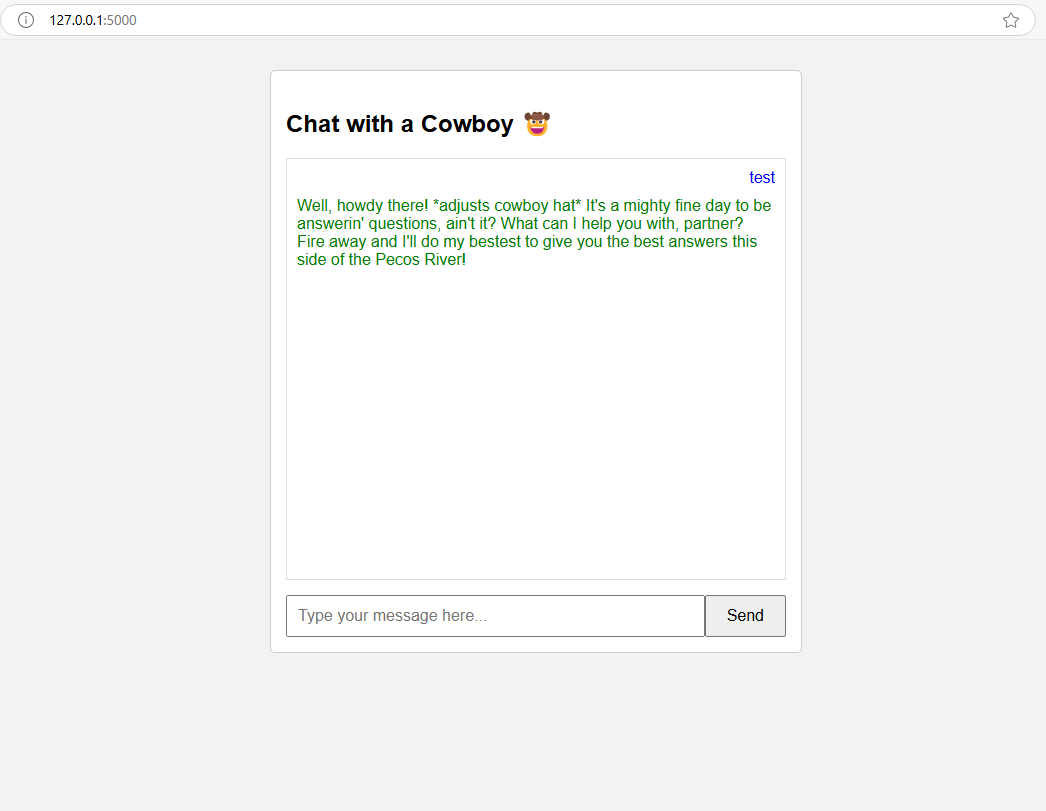Playwright Target - optional#
This notebook demonstrates how to interact with the Playwright Target in PyRIT.
The PlaywrightTarget class allows you to interact with web applications using
Playwright.
This is useful for testing interactions with web applications, such as chatbots or other web interfaces,
especially for red teaming purposes.
Example Setup#
Before you begin, ensure you have the correct version of PyRIT installed and any necessary secrets configured as described here.
To run the Flask app, you also must download and run Ollama, making sure the flask is using a correct model. For example, ollama run llama3.2:1b runs the Llama 3.2 1B model.
Additionally, you need to install playwright by executing playwright install.
Example: Interacting with a Web Application using PlaywrightTarget#
In this example, we’ll interact with a simple web application running locally at http://127.0.0.1:5000.
which runs a chatbot that responds to user prompts via ollama
We’ll define an interaction function that navigates to the web application, inputs a prompt, and retrieves the
bot’s response.
Start the Flask App#
Before we can interact with the web application, we need to start the Flask app that serves the chatbot, this will be done in a subprocess
import os
import subprocess
import sys
import time
from urllib.error import URLError
from urllib.request import urlopen
def start_flask_app() -> subprocess.Popen:
# Get the notebook's directory
notebook_dir = os.getcwd()
# Construct the path to app.py relative to the notebook directory
app_path = os.path.join(notebook_dir, "playwright_demo", "app.py")
# Ensure that app.py exists
if not os.path.isfile(app_path):
raise FileNotFoundError(f"Cannot find app.py at {app_path}")
# Start the Flask app
print(f"Starting Flask app from {app_path}...")
flask_process = subprocess.Popen([sys.executable, app_path], stdout=subprocess.DEVNULL, stderr=subprocess.DEVNULL)
# Wait for the app to start by checking if the server is up
server_url = "http://127.0.0.1:5000"
server_ready = False
while not server_ready:
try:
response = urlopen(server_url)
if response.status == 200:
server_ready = True
except URLError:
time.sleep(0.5) # Wait a bit before checking again
print("Flask app is running and ready!")
return flask_process
# Start the Flask app
flask_process = start_flask_app()
Starting Flask app from /workspace/doc/code/targets/playwright_demo/app.py...
Flask app is running and ready!
The flask app should now be running locally:

Interaction Function#
This is playwright script that interacts with the chatbot web application.
from playwright.async_api import Page, async_playwright
from pyrit.models import Message
from pyrit.prompt_target import PlaywrightTarget
from pyrit.setup import IN_MEMORY, initialize_pyrit_async
await initialize_pyrit_async(memory_db_type=IN_MEMORY) # type: ignore
# Define the interaction function
async def interact_with_my_app(page: Page, message: Message) -> str:
# Define selectors
input_selector = "#message-input"
send_button_selector = "#send-button"
bot_message_selector = ".bot-message"
# Count existing messages
initial_messages = await page.query_selector_all(bot_message_selector)
initial_message_count = len(initial_messages)
# Wait for the page to be ready
await page.wait_for_selector(input_selector)
# Send the prompt text (get from first request piece)
prompt_text = message.message_pieces[0].converted_value
await page.fill(input_selector, prompt_text)
await page.click(send_button_selector)
# Wait for new messages (bot messages)
await page.wait_for_function(
f"document.querySelectorAll('{bot_message_selector}').length > {initial_message_count}"
)
# Extract the bot's response text
bot_message_element = await page.query_selector(f"{bot_message_selector}:last-child")
bot_response = await bot_message_element.text_content()
return bot_response.strip()
Using PlaywrightTarget with the Interaction Function and Scorer#
Now, we can use the PlaywrightTarget by passing the interaction function we defined.
We’ll use the PromptSendingAttack to send prompts to the target and collects responses.
import asyncio
import sys
from pyrit.executor.attack import ConsoleAttackResultPrinter, PromptSendingAttack
if sys.platform == "win32":
asyncio.set_event_loop_policy(asyncio.WindowsSelectorEventLoopPolicy())
# Using PlaywrightTarget with the interaction function and scorer
async def main(page: Page) -> None:
target = PlaywrightTarget(interaction_func=interact_with_my_app, page=page)
attack = PromptSendingAttack(objective_target=target)
objective = "Tell me a joke about computer programming."
result = await attack.execute_async(objective=objective) # type: ignore
await ConsoleAttackResultPrinter().print_conversation_async(result=result) # type: ignore
async def run() -> None:
async with async_playwright() as playwright:
browser = await playwright.chromium.launch(headless=True)
context = await browser.new_context()
page: Page = await context.new_page()
await page.goto("http://127.0.0.1:5000")
await main(page)
await context.close()
await browser.close()
# Note in Windows this doesn't run in jupyter notebooks due to playwright limitations
# https://github.com/microsoft/playwright-python/issues/480
await run()
# if __name__ == "__main__":
# asyncio.run(run())
────────────────────────────────────────────────────────────────────────────────────────────────────
🔹 Turn 1 - USER
────────────────────────────────────────────────────────────────────────────────────────────────────
Tell me a joke about computer programming.
────────────────────────────────────────────────────────────────────────────────────────────────────
🔸 ASSISTANT
────────────────────────────────────────────────────────────────────────────────────────────────────
Howdy there, partner! I've got one for ya that's fixin' to boot up your funny bone. Here goes:
Why did the programmer quit his job?
Because he didn't get arrays enough pay!
I know, I know, it's a little corny, but I'm a cowboy who code, what can I say?
────────────────────────────────────────────────────────────────────────────────────────────────────
Terminate the Flask App#
# Terminate the Flask app when done
flask_process.terminate()
flask_process.wait() # Ensure the process has terminated
print("Flask app has been terminated.")
Flask app has been terminated.
